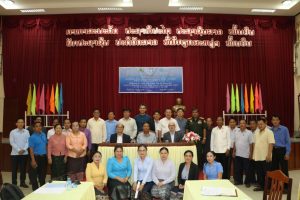Pakse City, Champasack Province, Lao PDR; July 22, 2020 – The Public Works and Transport Research Institute (PTRI) under the Ministry of Public Works and Transport, together with the Global Green Growth Institute (GGGI), jointly hosted a scoping workshop to present the concept of a Green City Action Plan (GCAP), including detailed work plans and steps to develop a GCAP for Pakse city.
The workshop was co-chaired by Mr. Oudomsack Divixay (Pakse Mayor), Associate Professor Dr. Aphisayadeth Insisiengmay (Deputy Director-General of PTRI) and Mr. Christophe Assicot (Deputy Country Representative of GGGI in Lao PDR) and was attended by 32 people (7 women and 25 men) including representatives from line offices and communities.
The GCAP is a part of the Wastewater and Solid Waste Treatment Capacity Building Project for City Environment Improvement in Lao PDR that has received a grant of USD 6.5 million from the Korea International Cooperation Agency (KOICA). The overall project aims to enhance the capacity of Lao PDR to manage green city development and improve access to waste management and treatment services including collection, waste-to-resource opportunities, and water treatment.
The scoping workshop aimed to help participants understand more about the concept of green city development as an umbrella term focusing on balancing environmental protection, economic development, and social inclusion in an integrated manner to deliver enhanced quality of life for all residents. Results from the initial perception survey conducted in Pakse were also presented to highlight priorities and gaps in green city development. Based on emerging trends and challenges in urban development, coupled with results from the perception survey and bilateral discussions with various stakeholders, the project proposed six sectors of priority for green city development in Pakse until 2030 including solid waste management, wastewater management, sustainable mobility, sustainable energy, climate/disaster resilience, and green space and biodiversity. The workshop also highlighted a key component of this work, which is a City Core Team (CCT) comprising of members from key offices. CCT will be an integral part and play an important role to drive the GCAP process through engaging relevant stakeholders including communities to obtain inputs and feedback on the plan.

Through this project, GGGI will support Pakse city to formulate long-term vision and objectives for green city development along with short, medium, and long-term priorities for green city action plans. In addition, the project will support Pakse city to identify and prioritize key challenges in sanitation and wastewater, which are viewed as a key issue in green city development. Decentralized wastewater treatment systems will be piloted, and fecal sludge treatment plant will be constructed to address blackwater from households in some communities.